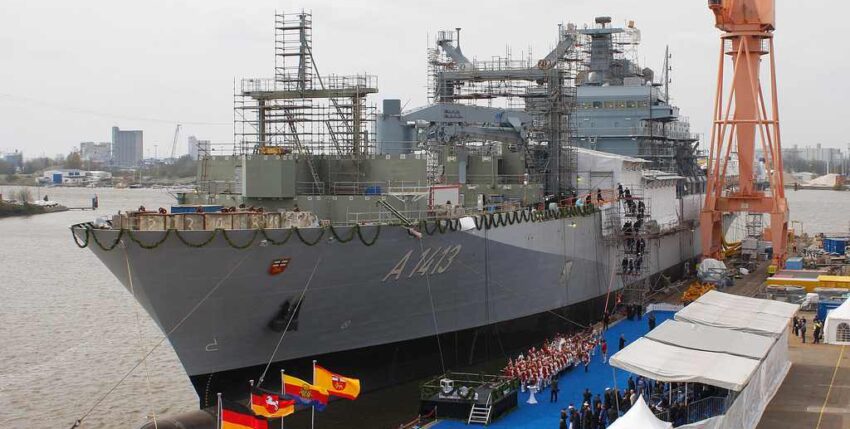On Tuesday 17 April 2012, the time had come: the German Navy's third task force provider (EGV) was christened Bonn in a festive ceremony. How important Tradition and identity The fact that the baptism was performed by Hanne Hufschmidt, the wife of Bonn's Lord Mayor, with a bottle of champagne and the blessing "I christen you "Bonn" and wish you and your crew a safe voyage at all times and always a hand's breadth of water under your sails. Kiel," took place! The fact that more than 100 people from Bonn took the week off to attend the christening in Emden also speaks for the interest of the people and the city of Bonn in "their" ship. A new line of tradition was also completed.
The common practice for selecting ship names is as follows:
The naming of naval units is generally based on geographical designations such as country, city and river names or numbers (Submarines). Federal states, cities and municipalities can apply for a sponsorship, which is a prerequisite for the naming of the park.
German Navy
Critics accuse the navy of a kind of soulless City-Country-River game when choosing names for their units. This leads to such unwieldy and emotionless names as North Rhine-Westphalia, as planned for the second unit of the new frigate 125 of the Baden Württemberg-class. The basic guidelines, which also apply to the naming of ships, are provided by the Tradition decree of the Bundeswehr before. With the decommissioning of the guided missile destroyer Lütjens, named after Admiral Günther Lütjens, in December 2003, the navy ended the tradition of naming its ships after people. This step seems logical in a post-heroic society.
The choice of the name Bonn was therefore the right one for precisely these reasons, as it simultaneously concludes and completes the formation of a new, republican line of tradition: the three EGVs of the Berlin class are called Berlin, Frankfurt am Main and Bonn! We remember:
- In the wake of the March Revolutions of 1848, the Frankfurt am Main the National Assembly from 18 May 1848 to 31 May 1849 as the first freely elected German parliament in the Paulskirche
- From 1949 to 1990 was Bonn Federal capital with a deliberately provisional character, this is where our Basic Law was born
- In the course of reunification Berlin The old and new capital of a republican Germany in 1990
The names of the persons responsible for the German republican history To honour central cities in a ship class is right! Berlin, Frankfurt am Main and Bonn stand for a new line of tradition in the best republican sense!
Further links:
- German Navy:
Technical data for the BERLIN class (702)
- German Navy:
New task force provider christened "Bonn"
- General-Anzeiger Bonn:
The German Navy's new task force supply ship is called "Bonn"











6 responses
First of all, I don't believe that the navy had a "master plan" in this regard - on the other hand, these three names are now taken and there is a chance to make something sensible out of them!
On the discussion about the allocation of personal names:
I suspect that the question no longer even arises in society. On the one hand, because we live in a post-heroic society (à la Herfried Münkler) - on the other hand, because the social-historical distance has become too great. Prussia, for example, now only appears in themed editions of Der Spiegel and on Guido Knopp; there is no real, lived connection to our history.
Tirpitz - controversial? He is the father of the naval construction programme, which resulted in the German fleet being a third of the size of the British fleet. Not an opponent to be taken seriously from the British point of view, yet he is accused of being a "warmonger". Perhaps it is finally time, after more than 100 years, to be more objective. Incidentally, I vehemently agree with the correct naming, but still ... see above.
It doesn't really matter what the reason for the decision is, if - later on - a comprehensible line of argumentation emerges. I believe that a small number of traditional names should be determined and retained alongside the federal states and republican capitals. I am in favour of Emden, Karlsruhe, Dresden and Cologne.
On the whole, the naming of the navy fits.
Yes, if the republican tradition had been intentional ... I'm more afraid that the naming was the product of successful lobbying by local councillors. But it's nice if it makes sense after all. In any case, cities and country names are more innocuous than personal names, although I personally would also like a frigate named Tirpitz or Henry of Prussia 🙂
One thing leads to another. Of course, the Navy is keen to establish contacts inland, where, unlike the other branches of the armed forces, it is not present. The sponsorship visit of crew delegations to the mayor or even the prime minister is always a press event. In this respect, this choice of name is mutually beneficial. In addition, many city names in the German navy have long traditions, such as Karlsruhe five times. Incidentally, the British, seen by many as a role model when it comes to maintaining tradition, have increasingly moved away from martial traditional names ("Battleaxe") in favour of city and county names (county class) in recent years. This is probably for the same reason. And controversial personalities such as Tirpitz do not help our country, but rather harm the public debate.
I agree with the explanation of a "republican tradition" in naming. Traditional names such as Emden, Karlsruhe, Dresden or Cologne should be taken into account when naming the federal states. Names like "Frauenlob", on the other hand, are no longer communicable.